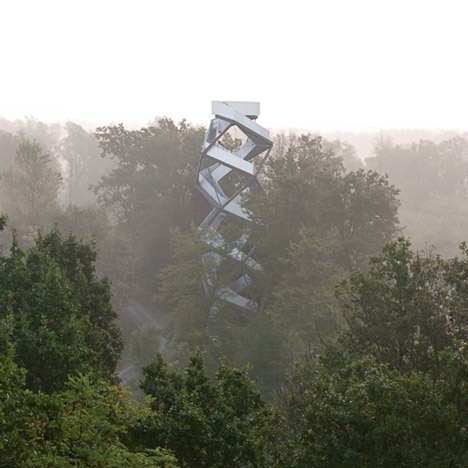
This observation tower by Munich office terrain:loenhart&mayr rises over the river Mur at the Austrian border with Slovenia.
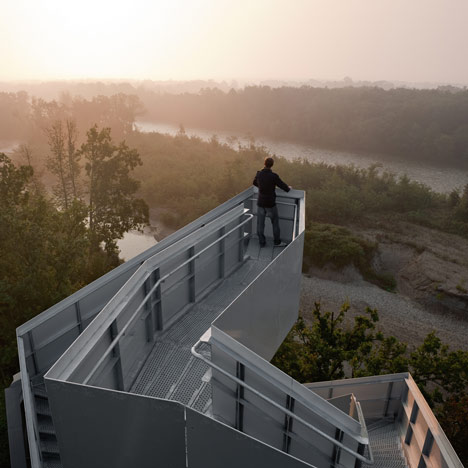
The aluminium-clad structure staircase curls back on itself at the top, forming a double spiral so that visitors on the way up pass those on the way down.
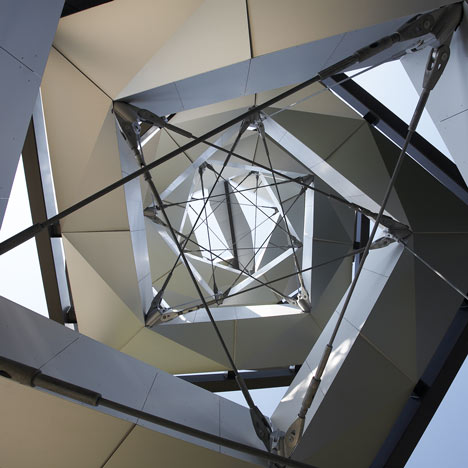
Here’s some more information, written by Lilli Hollein:
Up There All Treetops Are Still
A society that generally focuses on results tends to lose its sense for gradual emergence and for the discoveries one can make during processes and journeys to a destination. Already 2,500 years ago, Confucius had written: “The journey is the reward.” Some might consider that a nice way of skirting around disorientation, but is it worthwhile to be rushed off one’s feet?
Architecture is a wonderful means of representing, imposing, or arousing states of human nature. The concept of the recently completed Murturm by the architects Klaus K. Loenhart and Christoph Mayr then involves not only the elation of having reached the top, but also the enjoyment of the stages on the way there.
A deliberate foreign object made of steel and aluminum rises from the riparian forest in Southern Styria: a somewhat geometrical observation tower that nevertheless fits into the landscape as naturally as a harmonic counterpoint.
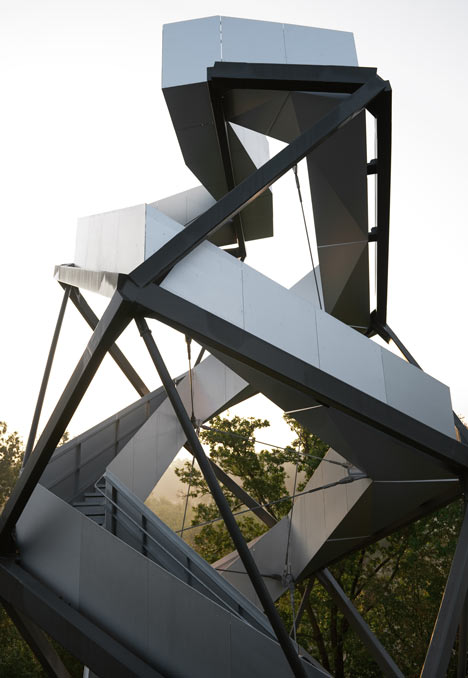
The border to Slovenia is marked by the Mur river in this part of Southern Styria, near Bad Radkersburg. Once a public-excluded security zone along the former Iron Curtain, the area became a de-facto nature reserve and is now part of the European Green Belt. Today, the view of the opposite river bank is relaxed, and both countries join forces to renaturate the course of the river and the pasture landscape.
Supported by Naturschutzbund Deutschland [German Nature and Biodiversity Conservation Union], the tower was originally only meant to mark the European Green Belt. In fact, however, it has become an architectural sculpture and a lookout that offers a panoramic view of the landscape.
Climbing up the 168 steps, one follows one’s own path, and yet one is drawn in by the landscape that can be observed from different heights and by the eyes of those one inevitably meets, because two intertwined stairwells wind up into the sky. At the highest point of this significant visual anchor, at a height of 27 meters, one finally realizes that the path never ends. The doubling of the ascent and descent and the three-dimensional interweaving bring forth the vis-à-vis.
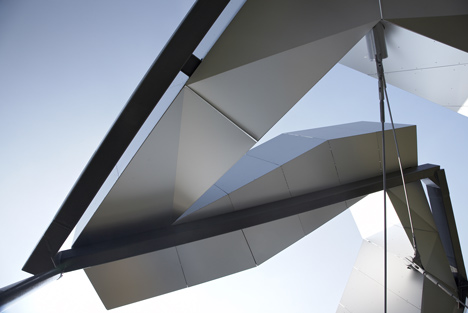
The double spiral staircase with its opposed flights of up and down steps has a famous forerunner nearby: ever since 1499, it has been witness to the eagerness of Friedrich III of Habsburg to experiment and to the brilliant architectural design of his castle in Graz. The special three-dimensional experience it creates has made the castle a place of pilgrimage for architects. Among them was Klaus Loenhart, Director of the Institut für Architektur und Landschaft at Graz University of Technology. Impressed and inspired, he and his colleague Christoph Mayr managed to transfer the poetry of this historical location into nature.
The supporting structure of the observation tower is designed like a tree. The lower part corresponds with the trunk, whereas the steel structure made of thinned-out tubes represents the more delicate branches up above. The tower was certainly an engineering challenge for the Office for Structural Design in Frankfurt. It is all the more surprising to feel the edifice, which looks amazingly massive and multi-braced, softly sway as one climbs the stairs. Seen from down below, one first notices the elegant nodal points of the structure. The steel girder joints result in a sophisticated and skillfully designed geometry that exhibits the three-dimensionality of the tower.
Depending on the weather and time of day, the wonderful gleam of the aluminum-clad stair balustrade continuously changes the appearance of the edifice. The beveled aluminum boards create a body and a play of surfaces without destroying the translucence. The flowing element of the recessed river bed and the piled-up flotsam is mirrored by the tower, which emerges from the topography with the same softness and precision.
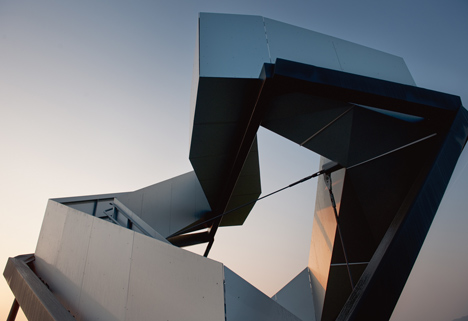
With this project in an unspoilt countryside that belongs to the European Green Belt biotope compound system, terrain:loenhart&mayr have set an example that puts nature in the limelight in two different ways. First, visitors enjoy rotating views of the surrounding landscape as they walk up and down the continuous spiral stairs. Their attention is directed both inward and outward. From a distance, the silhouette of the tower is interwoven with the landscape, but the watchful steps of those who climb up the stairs define a sensed inner space.
Second, the sculptural edifice itself explores the essence of nature, the double helix structure along which DNA components are stringed in parallel turns. It does not take a microscope to see that organic forms are often impressive compositions of curves and edges, of geometry and free, unlimited escalation.
Not mountain summits, as Goethe wrote, but the treetops of the wonderful riparian forest along the banks of the Mur river near Gosdorf unfold before the eyes of those who climb all the way up the tower. And yet, up there all is still. This is a place to pause for those who have come to the tower by bike, on their early morning jog or their Sunday walk. It is also a place that was quickly taken over by locals and—especially biking—tourists alike. One of the reasons for the public identification with the project is that the members of the surrounding communities were able to participate by making donations. Now, they visit the tower as if it were an old friend, they proudly read their own name on a plate, and again and again, they come to the same spot to take in the changing moods of the surrounding nature in all seasons. At the same time, they can watch the progress and efforts in renaturating this unique pasture landscape, in which terrain:loenhart&mayr are also taking part. Here, Styria has found its landmark. While Graz has its Uhrturm, Gosdorf now has its Murturm. The contemporary contribution has won the architectural competition.
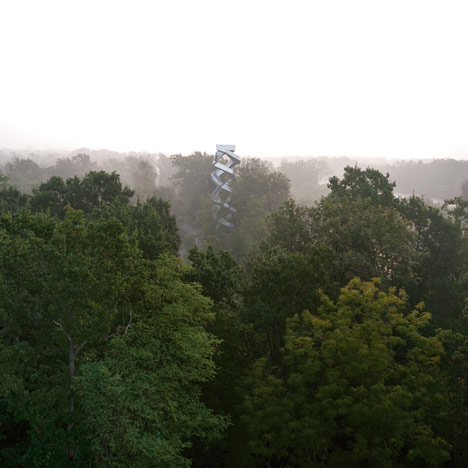
Client: Gemeinde Gosdorf Orts- und Infrastrukturentwicklungs KG
Design + planning of observation tower and exteriors: terrain:loenhart&mayr architects and landscape architects, Munich/Graz
Structural planning: osd – office for structural design, Frankfurt
Construction period: March – September 2009
Opening: 20 March 2010




所有评论